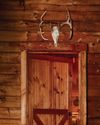Caught the Chromer bug? Make your fly reel scream louder than ever with our crash course in crushing it on the great lakes tributaries.

They call it steelhead madness for a reason. Obsessed is not too strong a word to describe the afflicted. In fall and winter, I’ve driven five hours to a Great Lakes tributary, slept for four, was on the water at 5 A.M., and was headed home at noon. I’ve stood for hours in 33- degree water, endured all manner of stinging precipitation, seen rods snap like twigs on days when the mercury never made it out of the single digits, and still not had a single touch from a steelhead. Is the suffering really worth it for a fish? You bet.
No other freshwater species can match the strength and wildness of a fresh chromer. Steelhead are capable of blistering runs, instantaneous 180-degree turns, and cartwheels that would put a gymnast to shame. The good news is that many Great Lakes tributaries are within driving distance of major metropolitan areas, and when the bite is hot, it seems you can’t help but hook up. But reality is a harsh master. The steel heading learning curve can be steep, the seasonal conditions brutal, and the nature of the beast fickle. Don’t let your cold bones and those cannonball runs be for nothing. Here are the most critical lessons for success—some I’ve learned from years of experience in New York, and some are gleaned from a steelhead veteran in the heart of Michigan’s chrome country. They apply on any Great Lakes tributary.
Go Long
Denne historien er fra October - November 2018-utgaven av Field & Stream.
Start din 7-dagers gratis prøveperiode på Magzter GOLD for å få tilgang til tusenvis av utvalgte premiumhistorier og 9000+ magasiner og aviser.
Allerede abonnent ? Logg på
Denne historien er fra October - November 2018-utgaven av Field & Stream.
Start din 7-dagers gratis prøveperiode på Magzter GOLD for å få tilgang til tusenvis av utvalgte premiumhistorier og 9000+ magasiner og aviser.
Allerede abonnent? Logg på
LIVING THE DREAM
After the author arrives in Maine’s fabled North Woods with a moose tag in his pocket, an adventure he’s been wanting to take his entire hunting life, reality sets in, and he learns a valuable lesson: Be careful what you wish for
Get the Drift
How to make an accurate windage call under pressure

First Sit
An icebreaker outing in a pristine spot produces the rut hunt of a lifetime
A Local Haunt
The author finds a sense of place in an overlooked creek, close to home

A Hop and a Pump
Jump-shooting rabbits with classic upland guns is about as good a time as you can have in the outdoors

Welcome TO camp
Is there any place better than a good hunting camp? It has everything: great food, games and pranks, and of course, hunting. Shoot, we don’t even mind going to camp for grueling work days in the summer. Here, our contributors share their favorite stories, traditions, and lessons learned from camps they’ve shared. So come on in and join us. The door’s open.
THE DEERSLAYERS
Before you even claim a bunk, you need to eyeball the hardware your buddies have brought. In the process, you’ll see that the guns at deer camp are changing. What was walnut and blued steel may now be Kevlar and carbon fiber. The 10 rifles featured here aren’t your father’s deer guns. They’re today’s new camp classics
THE JOURNEY TO PIKE'S PEAK
Last summer, the author and three friends ventured off the grid to a remote fish camp in Canada. They hoped for great fishing, but what they experienced was truly something else

Stage Directions
When early-season whitetails vanish from open feeding areas, follow this woods-edge ambush plan
Rookie Season
A pup’s first year, from preseason training to fall’s big show